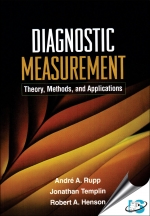Tab Article
This book provides a comprehensive introduction to the theory and practice of diagnostic classification models (DCMs), which are useful for statistically driven diagnostic decision making. DCMs can be employed in a wide range of disciplines, including educational assessment and clinical psychology. For the first time in a single volume, the authors present the key conceptual underpinnings and methodological foundations for applying these models in practice. Specifically, they discuss a unified approach to DCMs, the mathematical structure of DCMs and their relationship to other latent variable models, and the implementation and estimation of DCMs using Mplus. The book's highly accessible language, real-world applications, numerous examples, and clearly annotated equations will encourage professionals and students to explore the utility and statistical properties of DCMs in their own projects. The companion website (projects.coe.uga.edu/dcm) features data sets, Mplus syntax code, and output.


